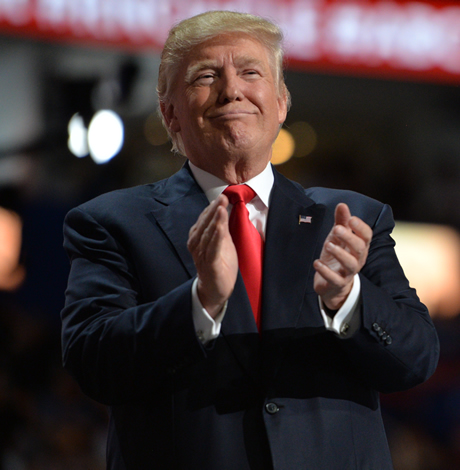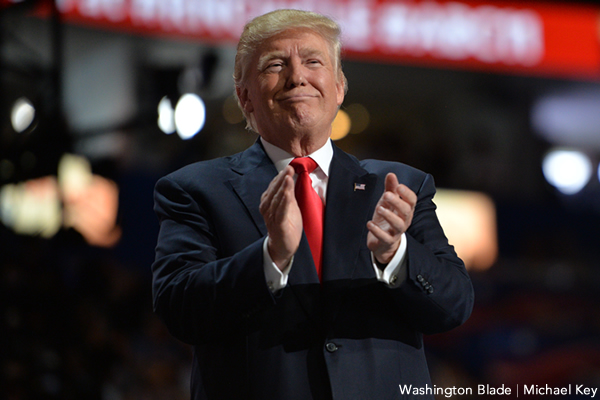Opinions
A gay defense of Donald Trump
Time for LGBT politicos to practice what they preach


Republican presidential nominee Donald Trump (Washington Blade photo by Michael Key)
Political pundits call this the “silly season” because of all the absurd, dishonest and hypocritical statements made by and on behalf of candidates at election time. There is no better example of this than the hysterical screeds against gay Republicans (including Log Cabin Republicans) simply because they support Donald Trump or haven’t gotten on the #NeverTrump train. The premise that LGBT voters should oppose Donald Trump because he’s anti-gay (among many other false reasons) is absurd, and it typifies the political myopia that affects so many in our community who view everything through a gay lens, demanding complete conformity to their politically correct agenda, unless, it sees, you’re a Democrat.
After all, Bill Clinton gave us “Don’t Ask, Don’t Tell” and the Defense of Marriage Act, yet he was enthusiastically supported by LGBT organizations. It was the same with John Kerry, who not only opposed same-sex marriage but also supported two state constitutional amendments to ban gay marriage in Missouri and Massachusetts. Of course, Hillary Clinton and Barack Obama also opposed marriage when they ran, coming out in support just recently, only after it was politically safe and necessary for them to do so. Yet none of them were labeled bigots or anti-gay because of their positions. It’s only when it’s a Republican who disagrees that the gay knives come out.
The fact is that any honest look at Trump’s record and views on gay rights shows that most of the attacks by gay Democrats on his views are simply incorrect.
Trump, of course, has been a New York Democrat and social liberal for most of his adult life, chummy with many Democratic politicians, including the Clintons, and active in many charities, including support for AIDS charities. He has a long record of public support for expanding gay rights, including adding sexual orientation to the Civil Rights Act of 1964. He stated support for employment nondiscrimination as far back as 2000 in his book, “The America We Deserve,” in which he wrote of his support for a country “free of racism, discrimination against women, or discrimination against people based on sexual orientation.”
He publicly supported repeal of “Don’t Ask, Don’t Tell,” and in an interview with The Brody File (a very conservative radio show) in 2011, in response to a question about civil unions, he said, “First of all, I live in New York. I know many, many gay people. Tremendous people. And to be honest with you … I haven’t totally formed my opinion. But there can be no discrimination against gays.”
During the Republican primary campaign, he was famously accused by some of his rivals, particularly Ted Cruz, of supporting “New York values,” code words for gay rights, but he never backed away from his support, stating in February that the country would continue to see “forward motion” on gay rights under his presidency, hardly the stuff of anti-gay bigotry.
After the horrific terrorist attack on the gay nightclub in Orlando by radical Islamist Omar Mateen, Trump gave an impassioned speech denouncing it, specifically citing the long history of homophobia in the Islamic world, where gays are imprisoned or killed in many Muslim nations. While many other Republicans were afraid to explicitly make the connection between radical Islam and homophobia, Trump was not, and yet for that he was attacked by the likes of HRC’s Chad Griffin, a sycophant for Hillary Clinton.
Trump and his surrogates repeatedly raised the issue of gay rights during the Republican convention, and Trump himself chose the well-known gay entrepreneur Peter Thiel to give the keynote address, in which he publicly announced his sexual orientation to the cheers and applause of many in the audience. Yet instead of celebrating its symbolic importance, the gay media and establishment ignored or dismissed it in their continuing role as shills for the Democratic Party.
Put perhaps the most dramatic expression of Trump’s fundamental support for gay rights was his heartfelt acknowledgement of the “GLBTQ community” in his acceptance speech at the convention, a truly historic step, one that would have been applauded by the Blade and gay politicos if it had been uttered by a Democrat.
It is certainly fair to criticize Trump for telling social conservatives that he would consider appointing justices to the Supreme Court who oppose the Obergefell decision, yet it would be extremely unlikely that even if Trump truly wanted to reverse it that he could do so.
There’s no doubt one can find much to criticize in Trump (and, for that matter, Hillary Clinton), but to label him anti-gay or a mouthpiece of the religious right is so off-base and incorrect it calls into question the credibility and honesty of those making such accusations. According to a recent poll of gay voters by NBC News, 36 percent of registered LGBT voters support a candidate other than Clinton, with 28 percent supporting either Trump or Gary Johnson, the Libertarian. It’s time for gay Democrats to stop reviling anyone who doesn’t agree with their political perspectives and try instead to exhibit the same tolerance they demand of everyone else.
David Lampo is the author of ‘A Fundamental Freedom: Why Republicans, Conservatives, and Libertarians Should Support Gay Rights’ and served on the boards of Equality Virginia and Log Cabin Republicans.
Opinions
Boston sanctuary designation must be backed by policy changes
A symbolic but important step for transgender protections

The city of Boston’s recent decision to give Sanctuary City status for the transgender community, while largely symbolic, is critically important. Following in the footsteps of Northampton, Worcester, Cambridge, and Pittsfield, it represents a local government’s commitment to standing with and protecting the transgender community. This is especially vital in a time when transgender individuals face increasing threats to their safety.
The number of trans people murdered in the U.S. nearly doubled between 2017 and 2021, a rise that coincided with increased anti-trans rhetoric and policies, particularly during the Trump administration.
Specifically, Black trans women have been disproportionately affected. While Black individuals make up less than one-fifth of the transgender population, they account for nearly three-quarters of known victims of anti-trans violence. Given this reality, a sanctuary designation should signal a meaningful commitment to protecting transgender residents, including addressing systemic issues within law enforcement.
Historically, both the LGBTQIA+ and Black communities have experienced harm at the hands of police. If a sanctuary designation is to be more than just a statement, it must come with actionable steps toward safety, justice, and rebuilding trust. Whether the trans community is widely aware of these votes in Boston and these other communities varies, but for those who are, such designations can provide a sense of validation, security, and hope — especially if they are backed by real policy changes.
While only a handful of cities across the U.S. have declared themselves transgender sanctuary cities, this is a movement that needs to grow. As a provider working with transgender individuals, I see firsthand the fear and uncertainty many face—simply for existing or for trying to access basic healthcare.
There have already been discussions about criminalizing providers who support transgender youth, and we have seen violent threats, including the bomb threats at Boston’s youth gender clinic a few years ago.
These designations send a strong message: that a city stands with trans individuals and the people who support them. They signal that local governments will not comply with oppressive, transphobic policies.
With Donald Trump openly advocating for a society that erases trans identities, it is crucial for cities to take a stand. Historically, civil rights movements—whether for women’s suffrage, Black rights, or LGBTQ+ rights — have only succeeded because enough people pushed back. Progress does not happen without resistance.
If more cities like Boston, step up and take these actions, it could create a powerful network of resistance that makes a real difference. Transgender individuals and their allies need to know that there are places where they will be protected, and these policies are a step toward ensuring that safety.
Predictably, the designation has prompted an outcry and recycled attacks that have been used against the queer community for decades. For example, the false narratives that LGBTQ+ people, particularly trans individuals, are pedophiles or predators or that gay men are inherently dangerous to children. The latter assumption was reinforced by scandals involving priests who abused young boys. Many people wrongly assumed that being a gay priest equated to being a child predator.
This same fear-mongering has since been weaponized against drag queens, particularly those who host story hours, and now it is being used to target transgender individuals.
While there have been isolated cases of people from any demographic committing heinous acts, it is entirely baseless to generalize an entire group based on the actions of a few.
The reality is that, according to data from the Administrative Office of the U.S. Courts, 95.5% of convicted pedophiles are men, and more than half are white. Given that transgender individuals make up about one percent of the U.S. population, most convicted pedophiles are not transgender.
Another key issue is the widespread misconception that transgender people already have equal rights. Many people assume that basic rights—like housing, employment, and healthcare—are equally accessible to all.
In reality, transgender individuals can still be legally denied housing, jobs, and medical care in many states. Queer people, in general, often face legal barriers to adoption, and while same-sex marriage was only recently legalized, it is now under political threat, with discussions about giving states the power to overturn it.
So the claim that transgender people have equal rights—especially compared to cisgender, straight white people—is not just misleading; it’s entirely false.
Will Dempsey, LICSW, is founder of Heads Held High Counseling, a social worker, drag queen and queer rights advocate. Heads Held High Counseling is a LGBTQIA+ virtual group therapy practice supporting queer and trans individuals across Massachusetts and Illinois.
Commentary
History of D.C. Pride: 1995-2007, a time of growth and inclusion
Rainbow History Project plans expansive WorldPride exhibit

In conjunction with WorldPride 2025 the Rainbow History Project is creating an exhibit on the evolution of Pride: “Pickets, Protests, and Parades: The History of Gay Pride in Washington.” In “Freedom on America’s Main Streets,” we discuss how during the 1990s the LGBTQ communities became more prominent across all areas of American life, the circumstances of moving official Pride activities to Pennsylvania Avenue, and the origin of the name “Capital Pride.”
Throughout the 1990s, LGBTQ visibility increased significantly in American society. The LGBTQ community’s presence extended beyond news coverage of AIDS activism, with members participating in various social movements. Gay Black men joined the Million Man March in 1995, carrying banners and signs proclaiming “Black by Birth, Gay by God, Proud by Choice.” Lesbians led abortion-rights rallies, LGBTQ Asians joined Lunar New Year parades, and LGBTQ Latinos marched in Fiesta DC.
Once again, financial difficulties around Pride activities led to the dissolution of the Gay and Lesbian Pride of Washington as an organization and the gay arts and culture non-profit One in Ten took over organizing Pride. One in Ten’s mission was not solely Pride planning, but rather year round activities, including an attempt to make an LGBTQ history museum. Due to the explosion of activities, the crowd sizes, and the growing concerns around feelings of exclusion brought on by the neighborhood’s identity as a primarily gay white male space, in 1995, One in Ten moved the Pride parade and festival out of Dupont Circle to Freedom Plaza on Pennsylvania Avenue.
Although the struggle for bisexual visibility had successfully added the B to the 1993 March on Washington, the push to add Trans and Queer identities to Gay Pride’s name was not yet successful; Pride was reborn as The Freedom Festival. Two years later, in 1997, the Whitman-Walker Clinic became not just a sponsor but also a co-organizer to alleviate some of the organizational and financial challenges. It was during this time that the event was officially renamed Capital Pride.
The name change sparked debate within the community. Frank Kameny, who had organized the 1965 pickets, harshly criticized the new name, arguing that it “certainly provides not an inkling of what we really mean: Pride that we are Gay.” He lamented that the name change “represents Gay shame.” However, others celebrated the inclusivity of the new name. L. A. Nash, a self-identified lesbian, wrote, “Gay is good—Gay, Lesbian, Bisexual and Transgender is far better.” Elke Martin further supported the change, stating, “A name is your identity, it gives you legitimacy and a seat at the table.” Capital Pride’s official name was now “Capital Pride Festival: A Celebration of Lesbian, Gay, Bisexual, Transgendered Community and Friends.”
In April 2000, the Millennium March on Washington highlighted divisions within the gay civil rights movement. Unlike previous grassroots marches organized by local activists, this event was orchestrated by national organizations like the Human Rights Campaign. However, its Millennium Pride Festival was by far the largest event with major headliners performing, including Garth Brooks and Pet Shop Boys. Critics argued that these events represented a corporatization of activism that sidelined political demands and local groups struggling for recognition.
In 2001, Capital Pride events were attracting 100,000 attendees. The festival was held on Pennsylvania Avenue with the U.S. Capitol in the background of the main stage. This location, often referred to as “America’s Main Street,” symbolized a significant visibility boost for the LGBTQ community. However, the Washington Post failed to cover the event beyond a simple listing in its events calendar. The outrage that ensued led Capital Pride director Robert York to state: “This is the biggest and best Pride we’ve had, and it is important to see it covered other than in the gay press.”
It wasn’t until 2007, however, that SaVanna Wanzer, a trans woman of color and Capital Pride board member, successfully established Capital Trans Pride. “The transgender community needs its own event,” Wanzer stated, “rather than just using us as entertainment. That’s all we’ve been allowed to do.” Trans Pride’s creation was a significant step toward greater inclusivity within the LGBTQ community.
Our WorldPride 2025 exhibit, “Pickets, Protests, and Parades: The History of Gay Pride in Washington,” will be installed on Freedom Plaza on May 17 to coincide with DC Trans Pride. We need your help to make it happen.
Opinions
Cory Booker’s missed moral moment
Imagine if trans stories had been part of historic speech

New Jersey Sen. Cory Booker sounded joyous, energetic, and heartfelt during his historic 25-hour, five-minute Senate floor speech.
Like millions of others watching the April 1 conclusion of his marathon homily for everyday people, I spontaneously burst into applause when he crossed the threshold and broke segregationist Strom Thurmond’s racist filibuster record against the Civil Rights Act of 1957. Booker called Thurmond’s 68-year record a “strange shadow” hanging over the Senate.
Booker’s surprise anti-Trump fest, perhaps a predicate for another presidential bid, was a Democratic demonstration of “doing something” in homage to his late mentor, civil rights hero John Lewis’s call to create “good trouble.”
“I rise tonight with the intention of disrupting the normal business of the United States Senate for as long as I am physically able,” Booker said in his opening remarks. “These are not normal times in our nation. And they should not be treated as such in the United States Senate. The threats to the American people and American democracy are grave and urgent and we all must do more to stand against them.”
Unlike others who offer up the usual stale talking points, Booker said, “I rise tonight because to be silent at this moment of national crisis would be a betrayal, and because at stake in this moment is nothing less than everything that makes us who we are,” including “that everyone’s rights will be equally protected and everyone will be held equally accountable under the law.”
Booker’s message was clear: “This is a moral moment in America. What are we going to do?”
It’s a question poking at the conscience of people who believe in fairness. For instance, podcaster Joe Rogan questioned the deportation of a gay hairdresser to a prison camp in El Salvador.
“The thing is, like, you got to get scared that people who are not criminals are getting, like, lassoed up and deported and sent to, like, El Salvador prisons,” Rogan said on Saturday. “This is kind of crazy that that could be possible. That’s horrific. And that’s, again, that’s bad for the cause. The cause is: Let’s get the gang members out. Everybody agrees. But let’s not, innocent gay hairdressers, get lumped up with the gangs.”
In Wisconsin, voters were so angry at unelected DOGE head billionaire Elon Musk blatantly handing out money to generate interest in a state Supreme Court race, they elected liberal Dane County Judge Susan Crawford over Trump-endorsed Waukesha County Judge Brad Schimel in the $100 million contest, the most expensive court race in U.S. history.
“As a little girl growing up in Chippewa Falls, I never imagined I’d be taking on the richest man in the world for justice in Wisconsin — and we won,” Crawford told supporters after her 55 percent to 45 percent victory early Wednesday.
Crawford won despite a last minute anti-trans attack ad. “Let transitioning male teachers use my girls’ bathrooms at school? Allow boys to compete against them in sports? Giving puberty-blocking drugs to children without parents’ consent?,” a woman says in the ad. “That’s who Susan Crawford sides with, and I’m not OK with any of it.”
Apparently Trump’s endorsement and Musk’s millions were not enough to push Schimel to victory; they needed to play the anti-trans card. Crawford’s campaign responded with her own hard-hitting ad that ends with: “I’m Judge Susan Crawford, and I’ll always follow the law and use common sense to decide what’s right.”
Was the last minute play with identity politics helpful or a moot distraction? Many old Democratic politicos want to get rid of identity politics and focus on the issues – as if the two aren’t intertwined.
Indeed, Cory Booker’s symbolism-caked epic discourse illustrated how identity is the beating heart of politics for anyone who’s not a white straight Christian man.
“We have to redeem the dream,” Booker said. “We have to excite people again. He, in the highest office of our land, wants to divide us against ourselves, wants to make us afraid, wants to make us fear so much that we’re willing to violate people’s fundamental rights.”
And yet, other than a quick reference to Stonewall, Booker forgot us during his 25 hours telling stories of regular people. He forgot Harleigh Walker who testified before the Senate Judiciary Committee about being a trans 16-year-old needing gender-affirming care in Auburn, Ala.
At the June 21, 2023 hearing Protecting Pride: Defending the Civil Rights of LGBTQ+ Americans, Booker talked about being a leader on the Equality Act with John Lewis leading in the House.
Lewis, a “Christian, Southern, Black, elder man,” would say that “these [discrimination] issues are so similar to what he was dealing with…Is there a line that goes through about the basic right to be an American and have equal rights?” Booker asked Human Rights Campaign President Kelley Robinson.
“A lot of Americans don’t understand how widespread the bullying and the threats and the violence are,” Booker said. “Something’s happened in the last decade, of this rise of threats and bullying and violence and murder of LGBTQ Americans at levels that are frightening to me.”
Addressing Harleigh Walker, Booker said: “I don’t think most Americans understand what it’s like to try to just live your truth for the average American that is LGBTQ or trans. Could you just tell…how it feels just to be a teenager, living your life as you do?”
“It definitely is a struggle, day to day,” Walker said. “Growing up in a conservative state where there is a lot of misinformation spread about what trans people are, what we do, and how we’re just like everybody else, it’s definitely been hard for me. Like I said in my testimony, I was severely bullied in middle school to the point where I had to drop out of public school because there was so much hate every day in the hallways, being misgendered, being deadnamed, and it got to physical violence at a certain point. And so I had to drop out of public school for that year, and the school wasn’t doing anything about it.”
Booker closed with: “If this is about protecting our children, the stories of Ms. Walker and other trans children — it just needs to be heard about what you’re enduring.”
Imagine if trans stories had been heard as part of Booker’s incredible “Moral Moment” speech. Maybe millions more would have awakened to the idea of fairness and equality for ALL.
Karen Ocamb is the former news editor for the Los Angeles Blade and Frontiers. She is currently working on a new LGBTQ+ Freedom Fighters project.















